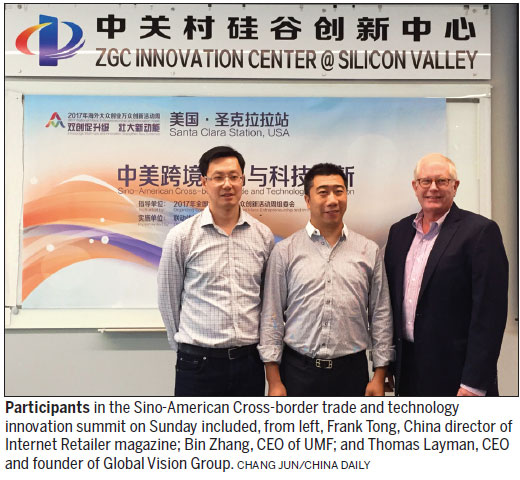China, US experts share expertise to streamline cross- border e-commerce
A group of Chinese and American experts on cross-border e-trade and financing gathered on Sunday to talk about how technology could improve collaborations and transactions between the world's two largest economies.
Zhang Bin, CEO of Beijing-based Union Mobile Financial Technology (UMF), brought a team with more than 10 years' experience with China's mobile-payment and financial technology to mingle with American counterparts in Silicon Valley at a Sino-American cross-border trade and technology summit.
"As a beneficiary in China's mass entrepreneurship and innovation movement, UMF now wants to give back to society and our successors," said Zhang, adding that he has witnessed the flourishing of a national campaign that was initiated in 2015 to encourage individuals to start businesses and cultivate the spirit of innovation in China.
Established in 2003, UMF was listed on the Shenzhen Stock Market in 2016. It has two wholly owned subsidiaries - Union Mobile Pay e-Commerce and Umpire International (US), partners with more than 110 financial institutions and more than 3,000 large enterprises and provides payment and cross-border services for 700,000 small- and medium-sized enterprises and 450 million individual users.
"The total transactions through our payment platforms surpassed $130 billion last year," said Zhang.
Thomas Layman, president and CEO of San Mateo, California-based Global Vision Group, acknowledged the potential for cross-border trade and e-payment was vast.
"The opportunities for new and existing players in supporting cross-boarder payments continue to grow, especially for low-value, e-commewrce payment," he said at the summit.
Frank Tong, China director of Internet Retailer magazine, said there are some 300 licensed third-party payment providers in China, many of which are authorized for facilitating online payment.
UMF has been issued a payment business license in China from the People's Bank of China for nationwide internet payments, mobile phone payments and bank card acceptance.
Technology is evolving that will accommodate the emergence of faster, more reliable, more transparent and less expensive options for cross-border payments and remittances, according to Layman.
"The biggest opportunity for [business-to-business] cross-border payments is in the small- and medium-sized business sector," Layman said.
"Currently, 55 percent of China's internet users have made a mobile payment, versus only 19 percent of internet users in the US," Layman said.
Zhang and his team keeps identifying new territories in overseas markets and has established footholds in the US and Canada.
"We utilize new technology such as AI, Blockchain, Cloud and Big Data to provide our customers not only cross-border payment services, but access to China's 500 million e-commerce shoppers," he said.
According to the latest report from the World Intellectual Property Organization, China ranks 22nd globally in terms of innovation in 2017, up three places year-on-year, and becomes the only middle-income country that has narrowed the gap with developed countries.
The Sunday summit is organized by the Organizing committee of the 2017 National Mass Entrepreneurship and Innovation Week, Zhongguancun Innovation Center in Silicon Valley and Association of Cross-border e-commerce.
junechang@chinadailyusa.com

(China Daily USA?09/19/2017 page2)